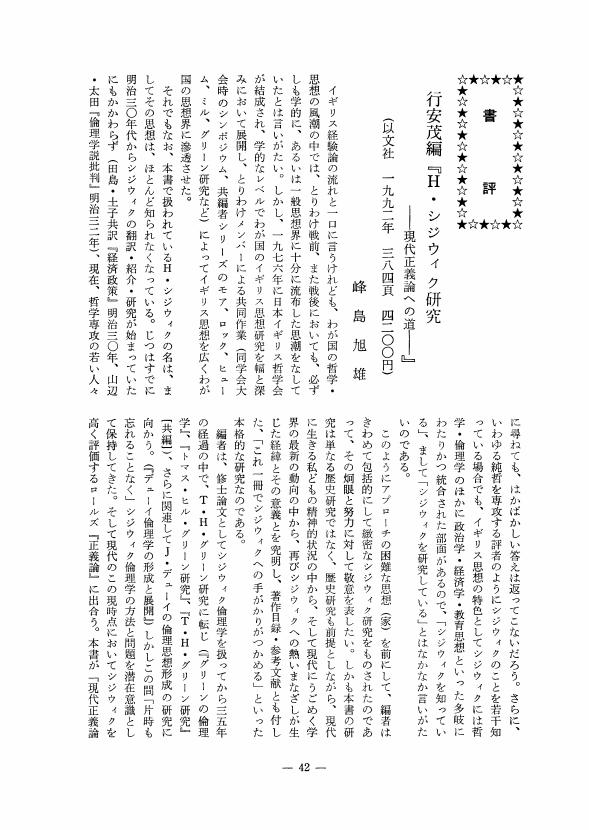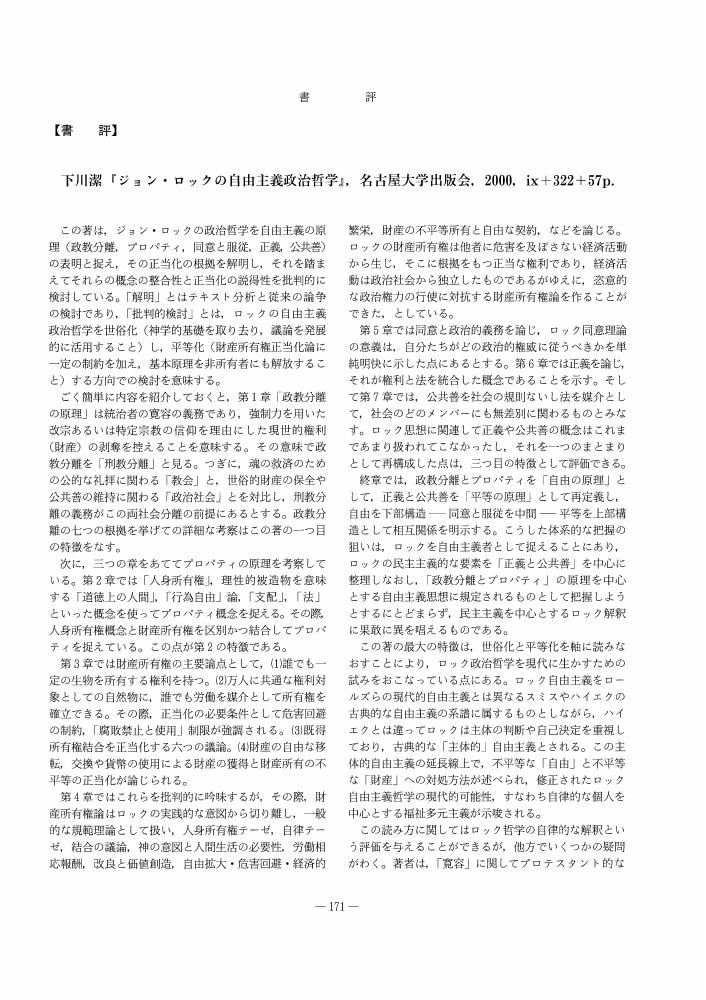5 0 0 0 OA ヒュームの正義概念と近代自然法学の伝統
- 著者
- 下川 潔
- 出版者
- 学習院大学
- 雑誌
- 人文 (ISSN:18817920)
- 巻号頁・発行日
- vol.4, pp.29-52, 2005
近年有力視されている解釈によれば、ヒュームは、グロチウス、ホッブズ、プーフェンドルフ、ロックらの近代自然法学の伝統に依拠しつつも、その伝統を批判的に継承し、経験的方法を一貫して用いることによって世俗的自然法学としての正義論を確立した、と言われる。しかし、ヒュームが何をどの程度まで近代自然法学の伝統に負っているか、また逆に、彼の自然法思想がいかなる点でどれほど独創的であるかは、実はまだあまり解明されていない。そこで本論文では、ヒュームがいかなる正義概念を用いたかという一つの限定された観点を採用し、その観点からヒュームと近代自然法学の伝統との連続性と断絶を検証する。それによって、ヒュームがこの思想伝統から多くの思考の素材を得ながらも、独創的な正義概念を作り出したということを明らかにする。また、彼がその正義概念を採用することによって、近代自然法学の貴重な遺産の一つが失われてしまったことも示す。 本論文の1 節から3 節までは、ヒュームがいかにグロチウスの正義概念を継承し、それを変容させたかを彼らの主要著作に即して明らかにする。ヒュームは、グロチウスから正義概念の核──正義とは、他人のものに手を出さないこと(alieni abstinentia)であるという見解──を学びとった(1 節)。しかし、彼はグロチウス正義概念の基礎にある完全な権利という概念を捨て、正義は権利を前提としないと考えた(2 節)。さらにヒュームは、配分的正義を本来的な正義の領域から追放したグロチウスの戦略を基本的に継承しながらも、一般規則の問題として考察する限り、配分的正義も正義の一部分をなすと考えた(3 節)。4 節と5節は、ヒュームの正義概念の独創性を考察する。彼の正義概念は、正義を規則遵守として明確に位置づけた点、また正義の対象を外的な財産だけに限定した点で独創的である(4 節)。この正義の対象の限定は伝統的な正義の対象の縮小化を意味するが、ヒュームは「三種の異なる善」に関する議論によってこの縮小化を正当化する。この議論は誤った前提や推論にもとづいているが、これによってヒュームは、近代自然法学が正義の領域内で保護しようとした生命、人身の自由、人間の尊厳などの価値を、法の平等な保護の外へと排除してしまう。This study aims to specify the nature and extent of Hume's indebtedness to the modern tradition of natural jurisprudence, and to show in concrete terms how and to what extent he was innovative in transforming that tradition. The focus is on the particular concept of justice that Hume used in developing his theory of justice. The first three sections examine the existing connections between Hume and Grotius; section 4 clarifies the innovative features of Hume's concept of justice; and section 5 critically assesses its significance. Hume borrowed from Grotius the core idea of justice as alieni abstinentia(abstinence from that which belongs to another man). But he dropped the notion of perfect rights, which had served as the basis of Grotius's concept of justice. Hume generally followed Grotius's strategy of excluding distributive justice from the sphere of strict justice, but he differed from Grotius in claiming that general rules of distribution could remain part of the subject matter of justice. Hume was innovative in making justice a matter of following rules, and confining justice to the protection of property. This confinement of justice involved a drastic reduction of the traditional scope of what is one's own, which Hume tried to justify by giving an account of 'three different species of goods'. A close examination reveals that his account is based on false premises and inferences. Yet it significantly removed from the equal protection of law the basic values that modern natural lawyers had tried to defend, i. e. life, personal liberty and human dignity.
4 0 0 0 OA ジョン・ロック『知性の正しい導き方について』(翻訳,その 1)
- 著者
- 下川 潔
- 出版者
- 中部大学
- 雑誌
- 言語文化研究 : 中部大学女子短期大学紀要 (ISSN:09158553)
- 巻号頁・発行日
- vol.6, pp.215-236, 1995-03-01
3 0 0 0 「人格知識論」とジョン・ロックの哲学
- 著者
- 下川 潔
- 出版者
- 中部大学
- 雑誌
- 人文学部研究論集 (ISSN:13446037)
- 巻号頁・発行日
- no.2, pp.123-154, 1999-07
2 0 0 0 OA ヒュームと近代自然法学の変容
- 著者
- 下川 潔
- 出版者
- 日本法哲学会
- 雑誌
- 法哲学年報 (ISSN:03872890)
- 巻号頁・発行日
- vol.2007, pp.40-52, 2008 (Released:2021-03-31)
This paper begins by identifying two prominent features of the modern tradition of natural jurisprudence. First, Grotius, Hobbes, Pufendorf and Locke adopted narrow concepts of justice. And second, they were deeply concerned with the origin of property. Given this seventeenth century background, the paper explores and clarifies the ways in which Hume transformed the tradition of natural jurisprudence and paved the way for Bentham’s utilitarianism. First, Hume adopted even a narrower concept of justice. He took over Grotius’s concept of justice as alieni abstinentia, and narrowed it further by excluding a human body and its attributes from the realm of justice. Hume reduced alienum to another’s ‘external possessions’ by considering ‘three different species of goods’ (THN 3.2.2.7) and arguing that external possessions alone were the proper object of justice. This argument actually involves a fallacy, but it did function to destroy the natural lawyers’ idea that justice serves to protect human dignity. Second, Hume transformed the earlier conventionalist theories of the origin of property. He developed a new naturalistic concept of convention by radically transforming a set of agreement related concepts; pactum (Grotius), covenant (Hobbes), and pactum or conventio (Pufendorf). Unlike the old concepts, Hume’s is entirely free from the notion of willing. He sees convention as a convergence or concurrence of more than two person’s senses of interest. Besides having this naturalistic concept, Hume resorts to an Epicurean principle. He explains the virtue of justice in terms of the feeling of pleasure which is produced, in a spectator’s mind, by the public utility of the system of justice. In spite of some existing differences between Hume and Bentham, these naturalistic and Epicurean strands in Hume did make a significant contribution to the rise of Bentham’s utilitarianism.
2 0 0 0 OA 書評
- 著者
- 下川 潔
- 出版者
- 学術雑誌目次速報データベース由来
- 雑誌
- 倫理學年報 (ISSN:04830830)
- 巻号頁・発行日
- vol.43, pp.35-50, 1994
2 0 0 0 OA <論文>ヒューム『道徳原理の探究』における正義と効用
- 著者
- 下川 潔
- 出版者
- 中部大学
- 雑誌
- 人文学部研究論集 (ISSN:13446037)
- 巻号頁・発行日
- vol.10, pp.177-201, 2003-07-31
2 0 0 0 OA リベラリズムとリバタリアニズムにおける労働所有権論 : 原理的批判の試み
- 著者
- 下川 潔
- 出版者
- 中部大学
- 雑誌
- 国際関係学部紀要 (ISSN:09108882)
- 巻号頁・発行日
- vol.5, pp.205-226, 1989-03-01
1 0 0 0 OA 書評
1 0 0 0 OA 書評
1 0 0 0 OA 書評
1 0 0 0 OA ジョン・ロックのプロパティ概念
- 著者
- 下川 潔
- 出版者
- 日本イギリス哲学会
- 雑誌
- イギリス哲学研究 (ISSN:03877450)
- 巻号頁・発行日
- vol.15, pp.5-17, 1992-04-01 (Released:2018-05-25)
- 参考文献数
- 6
- 著者
- 岡村 東洋光 下川 潔
- 出版者
- 経済学史学会
- 雑誌
- 経済学史学会年報 (ISSN:04534786)
- 巻号頁・発行日
- vol.39, no.39, pp.171-173, 2001 (Released:2010-08-05)
1 0 0 0 IR 【研究報告】イギリス近代の自由主義 : ロックからミルへ
- 著者
- 福吉 勝男 森 哲彦 別所 良美 寺田 元一 下川 潔
- 出版者
- 名古屋市立大学
- 雑誌
- 名古屋市立大学人文社会学部研究紀要 = Journal of humanities and social sciences (ISSN:13429310)
- 巻号頁・発行日
- no.15, pp.218-219, 2003-11-30
1 0 0 0 OA ヒュームの正義概念と近代自然法学の伝統
- 著者
- 下川 潔
- 雑誌
- 人文 (ISSN:18817920)
- 巻号頁・発行日
- vol.4, pp.29-52, 2006-03-25
近年有力視されている解釈によれば、ヒュームは、グロチウス、ホッブズ、プーフェンドルフ、ロックらの近代自然法学の伝統に依拠しつつも、その伝統を批判的に継承し、経験的方法を一貫して用いることによって世俗的自然法学としての正義論を確立した、と言われる。しかし、ヒュームが何をどの程度まで近代自然法学の伝統に負っているか、また逆に、彼の自然法思想がいかなる点でどれほど独創的であるかは、実はまだあまり解明されていない。そこで本論文では、ヒュームがいかなる正義概念を用いたかという一つの限定された観点を採用し、その観点からヒュームと近代自然法学の伝統との連続性と断絶を検証する。それによって、ヒュームがこの思想伝統から多くの思考の素材を得ながらも、独創的な正義概念を作り出したということを明らかにする。また、彼がその正義概念を採用することによって、近代自然法学の貴重な遺産の一つが失われてしまったことも示す。 本論文の1 節から3 節までは、ヒュームがいかにグロチウスの正義概念を継承し、それを変容させたかを彼らの主要著作に即して明らかにする。ヒュームは、グロチウスから正義概念の核──正義とは、他人のものに手を出さないこと(alieni abstinentia)であるという見解──を学びとった(1 節)。しかし、彼はグロチウス正義概念の基礎にある完全な権利という概念を捨て、正義は権利を前提としないと考えた(2 節)。さらにヒュームは、配分的正義を本来的な正義の領域から追放したグロチウスの戦略を基本的に継承しながらも、一般規則の問題として考察する限り、配分的正義も正義の一部分をなすと考えた(3 節)。4 節と5節は、ヒュームの正義概念の独創性を考察する。彼の正義概念は、正義を規則遵守として明確に位置づけた点、また正義の対象を外的な財産だけに限定した点で独創的である(4 節)。この正義の対象の限定は伝統的な正義の対象の縮小化を意味するが、ヒュームは「三種の異なる善」に関する議論によってこの縮小化を正当化する。この議論は誤った前提や推論にもとづいているが、これによってヒュームは、近代自然法学が正義の領域内で保護しようとした生命、人身の自由、人間の尊厳などの価値を、法の平等な保護の外へと排除してしまう。
- 著者
- 下川 潔
- 出版者
- 岩波書店
- 雑誌
- 思想 (ISSN:03862755)
- 巻号頁・発行日
- no.1052, pp.105-126, 2011-12
1 0 0 0 ヒューム『人間本性論』における正義と効用
- 著者
- 下川 潔
- 出版者
- 中部大学
- 雑誌
- 人文学部研究論集 (ISSN:13446037)
- 巻号頁・発行日
- no.7, pp.1-28, 2002-01
1 0 0 0 功利主義の歴史的意義と現実的課題の研究
3年間にわたる本研究の最大の目標の1つは、功利(公益)主義の古典原典、それも出来れば未刊の草稿に遡って研究を拡大、深化させ、その成果を国際的に問うことであった。幸い、ベンサム草稿のマイクロ・フィルムを一括購入出来、ロンドン以外でこれを持つのは、日本が最初ということになった。永井、音無、有江、深貝、堀田、桜井、市岡、近藤、立川らは、これによって研究をすすめ、前6名は、その成果を第5回国際功利(公益)主義学会(ニューオーリンズ、1997年3月)で発表した。その後、研究協力を仰いだ坂井、奥野、児玉らがこの線にそって新たに研究を開始している。他方、いま1つの目標は、実践道徳として今日生きている功利(公益)主義が理論的、実践的にいかに機能しているかを確認し、今後さらに人類の福祉と地球環境の保護のために功利(公益)主義をいかに理論的、実践的に展開していくべきかを、考察することであった。この点でも、もちろん、国際交流は必要であって、山内は、オーストラリア国立大のシンガー教授と連携しつつ、生命倫理の問題で研究を深め、樫(研究協力者)もシンガー教授の著書を翻訳して、この面での功利(公益)主義的思考の意義を広めた。理論面では、永井、有江、深貝の3名は、1996年9月、ロンドン大学において、バリー教授の著書(Brain Barry,Justice as impartiality)をめぐっての、日英合同研究会に参加し、それぞれおよそ、1時間半の質疑応答をおこなった。これには、バリー教授自身が参加したのみならず、ローゼン教授、スコフィールド、ケリ-、クリスプ各博士など、約15名がイギリス側から討議に参加し、日本側には他5名が参加した。こうした研究会活動の結果、およそ、国際学会における日本からの発信については、国際的に一定の評価を受け、日英合同研究会の基礎も、一応固まったように思える。若手の研究者も、現れつつあり、今後の一層の理論的、実践的展開が期待される。1998年7月、待望の日本功利(公益)主義学会が旗揚げ出来るようになったのも、3年にわたる本研究補助があり、そのお蔭で研究会を継続できたからである。









